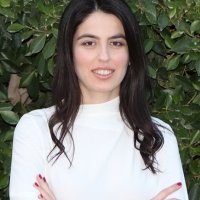
A blog of the Middle East Women's Initiative
My work helps raise awareness about the benefits of green building and inspires others [in Iraq] to adopt sustainable practices.
Women and youth are uniquely affected by climate change in Iraq, and their involvement in response efforts is essential. Climate change exacerbates pre-existing inequalities and disproportionately affects vulnerable populations; women and youth are at greater risk of displacement and adverse health impacts, in addition to a lack of participation in decision-making and access to resources.
Despite these challenges, they also have a critical role to play in advancing towards a more sustainable future. They can contribute their knowledge, skills, and perspectives to address climate change and promote sustainable development. For example, women’s voices are vital in sustainability efforts across various sectors. Youth can also be at the forefront of innovative solutions, leveraging their technological skills to develop new tools and approaches to address climate change.
Discovering entrepreneurship
My journey as the Founder & CEO of KESK highlights the role of women and importance of entrepreneurship and innovation in creating new opportunities to address environmental and climate change challenges in the region. I hail from the Kurdistan region of Iraq, but I was born and raised in Baghdad, Iraq. I lived in Baghdad until 2006, after which I moved to Kurdistan due to the civil war and completed my undergraduate degree in civil engineering. Following this, I briefly worked in the public sector before realizing it was not my calling. At that time, entrepreneurship was not popular, rather everyone wanted a government job. I then applied for the U.S. Fulbright program and was awarded a scholarship to pursue a master's degree abroad, which I believed would be the best way to progress.
During my graduate studies in the United States, I became familiar with the concept of green buildings. I have a deep interest in the environment and am concerned about climate change and its impact, so I knew that a career in green building was the right path for me. I returned to Iraq in early 2015, where I encountered a vastly different landscape resulting from the ongoing ISIS war. I joined the UN, but my passion for green building persisted. While I did not have a specific plan to become an entrepreneur initially, I felt a strong desire to contribute in that capacity. I noticed that no one was involved in this area, and there was a lack of awareness and interest in green building. I went to the United States twice, at my own expense, to receive training and accreditation from the US Green Building Council in 2016-2017. When I returned, I began to offer my services as an independent consultant and eventually started my own business in the green building industry.
Green technology in Iraq
Since the establishment of KESK in October 2018, we pivoted twice to accommodate demand and advance our innovations and solutions. Iraqis get less than 12 hours of grid electricity each day. The alternative is to use diesel generators, which are inefficient, polluting, and highly expensive, costing 15 times more than grid electricity. With increases in demand for constant power supply, the country is on the verge of a huge crisis; power cutoffs reach 20 hours per day during peak demand periods. Our mission is to make the “green way” easiest by making renewable energy technologies trustable, accessible to all, and profitable. Powered by cloud computing, our solar energy solutions allow clients to shift to a more sustainable and reliable source of energy, track their energy savings, and access new revenues through carbon credit trade.
As an entrepreneur in the domain of green building and Greentech, I have the potential to make a significant impact on mitigating the effects of climate change in Iraq. My work helps raise awareness about the benefits of green building and inspires others to adopt sustainable practices. Additionally, by providing services and products that promote energy efficiency and sustainability, we help reduce greenhouse gas emissions and contribute to a more sustainable future for Iraq and the region. With the help of an all-star engineering, operations, and business development team, our annual installation capacity has reached 1000 KWP. This is equivalent to planting 67,500 mature trees to reverse the impact of carbon dioxide emissions.
I am optimistic about the future, knowing that we can work together toward mitigating threats and securing a prosperous, peaceful, and livable planet. I also find peace knowing that governments and corporations are shaping new ways in response to climate change and scaling up their engagement in advancing sustainable development.
Author


Middle East Program
The Wilson Center’s Middle East Program serves as a crucial resource for the policymaking community and beyond, providing analyses and research that helps inform US foreign policymaking, stimulates public debate, and expands knowledge about issues in the wider Middle East and North Africa (MENA) region. Read more


Middle East Women's Initiative
The Middle East Women's Initiative (MEWI) promotes the empowerment of women in the region through an open and inclusive dialogue with women leaders from the Middle East and continuous research. Read more

Explore More in Enheduanna
Browse Enheduanna
Women are the Catalysts for Change in Lebanon

How Education Can Empower Young Women in MENA


